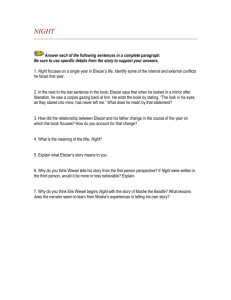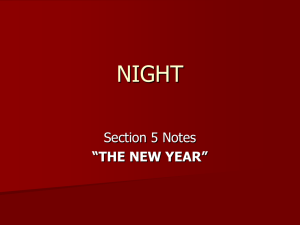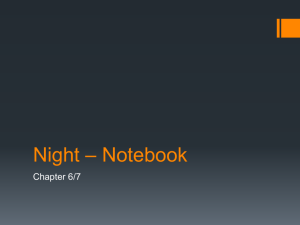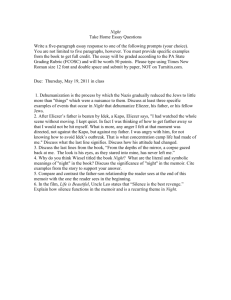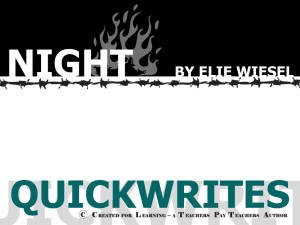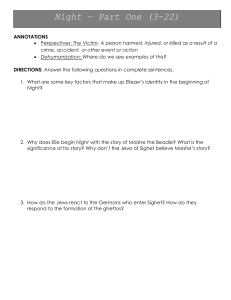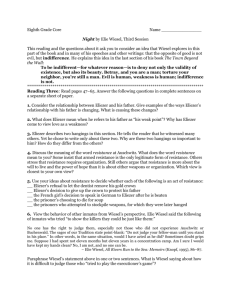Write each sentence and fill in the blank with the correct word
advertisement
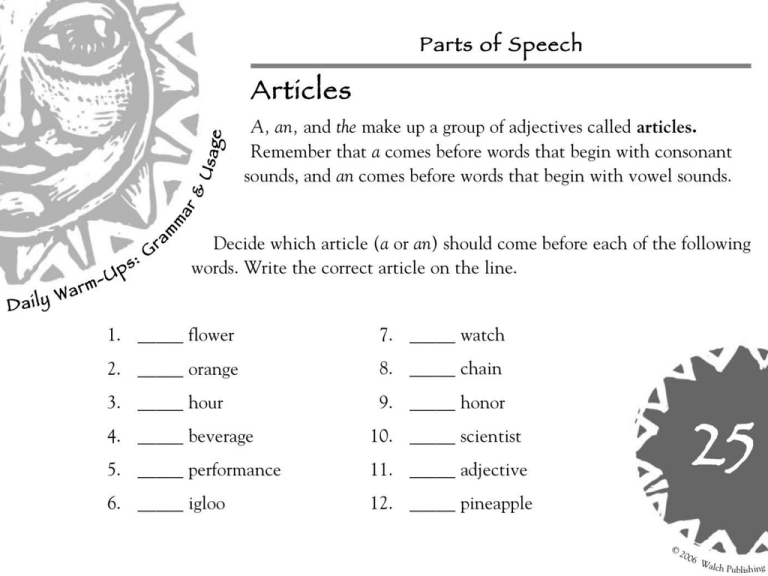
Choose the correct word or phrase within the context suggested by the sentence. Pasta boiling in water, __________, and garlic bread baking in the oven welcomed Francisco as he opened the door. A. simmered tomato sauce in the pan B. tomato sauce simmering in the pan C. tomato sauce that simmered in the pan D. saucy tomatoes that were simmering in the pan 1. While running, an idea began to fascinate Elie. What was the idea? What kept him from carrying out his idea? 2. What did Elie realize about Rabbi Eliahou and his son? 3. What was the name of the camp to which the men walked? 4. Describe Elie's meeting with Juliek. 5. How long were they at Gleiwitz? Where did they go next? 6. What happened to Mr. Wiesel, Elie's father? 7. What was Elie's only desire? 8. What happened on April 10, 1945? Moishe as an Outsider - Outsider archetypes do not fit in with the mainstream society in which they are placed. They are often used to comment on a particular society, give us an alternative point of view, or create change in the society. Explain how Moishe the Beadle from chapter 1 of Night fits the description of an Outsider archetype. How does he not fit into the mainstream society of the novel? When the sirens sound, the guards take cover, leaving the fences and food unwatched. A crowd hungrily stares at an unguarded cauldron of soup, but no one dares to take any soup because, as Eliezer explains, “Fear was greater than hunger.” Finally on man does attempt to get some food, but he is shot in the process. Pick one of the following and answer in a paragraph or two. Use evidence from the text: 1. How far do you believe the prisoners can be pushed before they rebel, if at all? For instance, would the prisoners be more likely to revolt or die of hunger, and why? 2. Eliezer called the man who is shot a hero. Do you agree? Explain. 3. If you were in this situation, do you think that you would try to get some soup or just watch, and why? While in the hospital, Eliezer hears news of the Red Army approaching. Eliezer’s neighbor makes the comment, “I have more faith in Hitler than in anyone else. He alone has kept his promises, all his promises, to the Jewish people” (81). What does he mean by saying this? How does it connect back to the Jewish people’s struggle with their faith. When they reach Gliewitz, Eliezer happens across Juliek, the Polish musician from earlier in the novel, and his violin. While there, Juliek gives his final performance to a mass of dying people by playing a piece of a Beethoven concerto. This act is symbolic in the context of the book. What is this act symbolic of? How does it show that? Use page 49 as a reference. 1. Who kept Eliezer from giving up and dying during the death march? A. B. C. D. Rabbi Eliahu Juliek Eliezer’s father Moishe the Beadle 2. What happens to Eliezer’s father in Buchenwald? 3. What happened on April 10, 1945? • Choose the correct word or phrase within the context suggested by the sentence. During our vacation in the Bahamas, we hope __________, to enjoy beautiful sunsets, and to dance ourselves dizzy at reggae clubs. A. B. C. D. that we eat delicious seafood that eating delicious seafood occurs to eat delicious seafood eating delicious seafood Write the sentence and identify the parts of speech. neither yours nor any mans death is needed to consummate the series of my being and accomplish that which must be done but it requires my own (death) Correct the faulty parallel structure. After giving Jeremy her phone number, Felicia had to tolerate his late night calls, the fact that he carried on stupid conversations, and requests for her math homework. Struggles with faith are very prevalent in chapter 5. Write a response on how the author uses the struggle of faith to drive the plot. How does the struggle appear during the two holidays at the beginning of the chapter? What is happening to Eliezer? Akiba Drumer? The rabbi? What happens to those who lose their faith? What replaces the void left by Eliezer’s lost faith? When they reach Gliewitz, Eliezer happens across Juliek, the Polish musician from earlier in the novel, and his violin. While there, Juliek gives his final performance to a mass of dying people by playing a piece of a Beethoven concerto. This act is symbolic in the context of the book. What is this act symbolic of? How does it show that? Use page 49 as a reference. 1. How are father-son relationships used throughout the novel? 2. How is the struggle to maintain Jewish faith portrayed throughout the novel? 3. What does this show about making it through difficult time? 4. How does this connect back to us? 1. 2. 3. 4. 5. Don’t raise hands. Listen to others. Address one another respectfully. Base all opinions on the text. Address all comments to the group. No side conversations (It’s rude.) 6. Take turns and be careful not to interrupt others. 7. Be mindful of “air time”. Don’t hog all the discussion time. 8. Be strong in your thoughts and ideas, but be flexible and willing to listen to others’ opinions. 1. Who kept Eliezer from giving up and dying during the death march? A. B. C. D. Rabbi Eliahu Juliek Eliezer’s father Moishe the Beadle 2. What happens to Eliezer’s father in Buchenwald? 3. What happened on April 10, 1945? Throughout the book, characters demonstrate how survival instincts can override moral decisions and actions. For instance, sons beat or abandon their fathers in order to survive. In your opinion, is this an understandable, or forgivable, phenomenon? Write an editorial voicing your opinion. Rewrite the sentence using correct parallel structure. During our vacation in the Bahamas, we hope that we eat delicious food, to enjoy beautiful sunsets, and to dance ourselves dizzy at reggae clubs.
